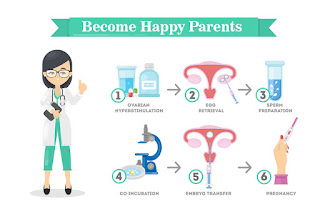Why IVF Fails with Good Embryos?
IVF is an extremely successful procedure.
It’s also very expensive and time-consuming, with cycles often taking between
one and two months from start to finish.
So why does IVF fail with good embryos?
There are many different reasons, but the main culprits are often connected to
the embryos themselves or their environment before implantation.
Here are some of the most common reasons
why IVF fails with good embryos, and what you can do about them before moving
forward with your next IVF cycle.
What
Causes Fresh Embryo Transfers to Fail?
In today’s technological world, there is a
great deal of information available to expectant parents who are considering
having a child via in vitro fertilization (IVF). While a fairly good
understanding exists regarding what happens from start to finish during an IVF
cycle and pregnancy, there isn’t much information about what causes embryos to fail.
This can be frustrating for couples because
they believe they have done everything right in order to make their dream of
having a child together come true, says the best
IVF center in Indore.
Although no one knows for sure why certain embryos do not survive after
transfer, we have some theories that may help you understand more about what
can go wrong.
So, if your fresh embryo transfers don’t
end up resulting in a positive pregnancy test, try not to worry. It could have
nothing at all to do with your fertility or ability to conceive. Some of these
reasons include: the shock during the egg retrieval process, the health of the
uterus, age and mental health of the woman, etc.
How
often do fresh embryo transfers fail?
While most of us are aware that frozen
embryo transfers are much more likely to fail than fresh ones, what many people
don’t realize is that even fresh embryo transfers can fail. In fact, 20% to 25%
of fresh embryo transfers end in miscarriage.
What
to do if you have a failed fresh transfer?
The pain and embarrassment that comes along
with a failed fresh transfer is bad enough, but there are some steps you can
take after your transfer failure to make sure that it doesn’t happen again. For
starters, it’s important to find out why your embryo didn’t stick — were they
chromosomally abnormal? Did they fail to properly develop in culture? These are
questions only your IVF
center in Indore
can answer, so be sure to get in touch with them as soon as possible. If all
goes well, it might just be a matter of tweaking your protocol; if not, you
might need to move on to other options like donor eggs or embryos.
Final
Thoughts:
While it’s possible to determine why an
embryo fails to implant in a woman’s uterus, more research is needed before a
definitive cause can be determined. For now, researchers need to continue
collecting data on successful pregnancies and focus on treatments that help
embryos attach properly. When these two goals are achieved together, they may
very well lead to increased pregnancy rates for women using in vitro
fertilization.




Comments
Post a Comment